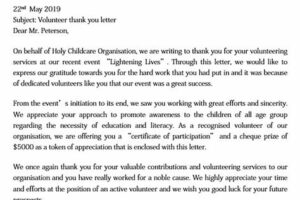Table of Contents
Does work experience include volunteer work? Find out the significance of volunteer experience in enhancing your professional profile. Explore the benefits of volunteering and how it can contribute to your overall career development. Discover how to effectively showcase your volunteer experience on your resume and during job interviews. Learn how employers perceive and value volunteer work when evaluating candidates. Gain insights into leveraging your volunteer experience to stand out in the competitive job market.
When it comes to work experience, many individuals may wonder if volunteer work should be included in this category. The answer is yes! Volunteer work can provide valuable skills and experiences that are just as relevant and beneficial as traditional paid employment. In fact, including volunteer work on your resume or job application can demonstrate your dedication, passion, and willingness to contribute to the community. Not only does volunteering allow you to give back, but it also allows you to develop and enhance important professional skills such as teamwork, leadership, communication, and problem-solving. Therefore, it is essential to recognize the significance of volunteer work and its inclusion in the broader concept of work experience.
The Importance of Work Experience
Work experience plays a vital role in career development and is often a key factor for potential employers when evaluating job applicants. It provides individuals with the opportunity to gain practical skills, industry knowledge, and a deeper understanding of their chosen field. Many individuals wonder whether volunteer work can be considered as work experience. In this article, we will explore whether volunteer work can be included in one’s work experience and its potential benefits.
Defining Work Experience
Work experience typically refers to the paid employment that an individual has accumulated over time. It includes any previous jobs held, internships, or apprenticeships where the individual received compensation for their work. Employers often value work experience as it demonstrates a candidate’s ability to perform the tasks required for a specific role and proves their dedication to professional growth.
Distinguishing Volunteer Work
On the other hand, volunteer work involves offering one’s services without expecting financial compensation. This type of work is typically done for charitable organizations, non-profit entities, or community-based initiatives. Volunteers contribute their time and skills to support causes they believe in, often with the aim of making a positive impact on society.
Transferable Skills
While volunteer work may not be classified as traditional work experience, it still provides individuals with valuable transferable skills. These skills can be utilized in various professional settings and are highly valued by employers. For example, volunteering can enhance one’s communication, teamwork, leadership, and problem-solving abilities. These skills are applicable across different industries and can be showcased on a resume or discussed during job interviews.
Building Networks and References
Volunteer work also offers individuals the opportunity to network and make connections within their chosen field. While volunteering, individuals may interact with professionals, potential mentors, and other like-minded individuals who can provide guidance and support. Additionally, supervisors or coordinators from volunteer organizations can serve as references for future job applications, adding credibility and value to an individual’s resume.
Showcasing Initiative and Dedication
Engaging in volunteer work demonstrates an individual’s initiative and dedication to personal growth. It highlights a willingness to contribute to society and make a difference, even without financial gain. Employers often value these qualities as they indicate a proactive and motivated individual who is likely to bring the same enthusiasm and commitment to their paid employment.
Relevance to the Job Application
Whether or not volunteer work is considered as part of an individual’s work experience depends on its relevance to the job application. If the volunteer work is aligned with the skills and responsibilities required for the desired role, it can certainly be included in the work experience section of a resume. By highlighting relevant volunteer experiences, individuals can showcase their abilities and commitment to the field, increasing their chances of being considered for a position.
Combining Paid and Volunteer Work
In many cases, individuals may have a combination of both paid and volunteer work experiences. It is essential to present these experiences accurately and clearly in a resume or job application. Separating them into distinct sections, such as Professional Experience and Volunteer Experience, allows employers to understand the different contexts in which an individual has gained skills and contributed to various causes.
Emphasizing Achievements and Impact
When including volunteer work in a resume or job application, it is crucial to highlight specific achievements and the impact made through these experiences. By quantifying results, sharing success stories, or providing testimonials, individuals can effectively convey their skills and contributions to potential employers. This allows employers to see the value an individual brings, regardless of whether the work was paid or voluntary.
Continuous Learning and Growth
Lastly, both work experience and volunteer work contribute to an individual’s continuous learning and growth. Engaging in volunteer work allows individuals to explore new fields, broaden their horizons, and develop new skills. This ongoing personal and professional development enhances an individual’s overall employability and demonstrates a willingness to adapt and learn in various environments.
Conclusion
While work experience traditionally refers to paid employment, volunteer work holds immense value and can certainly be included as part of one’s work experience. The transferable skills gained, networking opportunities, and the initiative demonstrated through volunteer work make it a valuable asset for individuals seeking job opportunities. By effectively showcasing volunteer experiences and emphasizing their relevance to the desired role, individuals can increase their chances of securing employment and furthering their professional growth.
What is Considered Work Experience?
Work experience typically refers to the practical knowledge and skills gained through paid employment in a specific field or industry. This can include part-time or full-time positions, internships, or any other form of engagement where an individual is compensated for their work. Work experience is valued by employers as it demonstrates the ability to meet job requirements and perform tasks related to the position.
Can Volunteer Work Be Considered as Work Experience?
Yes, volunteer work can be considered as work experience, especially if it is relevant to the field or industry you are applying to. While volunteer work is usually unpaid, it allows individuals to gain valuable skills, knowledge, and experience that can be transferrable to future paid employment. Including volunteer work on your resume or CV can showcase your commitment, dedication, and practical experience, making you a more attractive candidate to potential employers.
How to Include Volunteer Work in Your Work Experience Section
When including volunteer work in your work experience section, treat it similarly to paid employment. Start by providing the name of the organization, the position you held, and the dates of your involvement. Describe your responsibilities, duties, and accomplishments in the same way you would for a paid job, highlighting any relevant skills or experiences gained from the volunteer work. This demonstrates to employers that you have the necessary abilities and dedication to succeed in a professional setting.
Highlighting Transferable Skills
One benefit of including volunteer work in your work experience section is the opportunity to highlight transferable skills. Many skills gained through volunteer work, such as leadership, communication, problem-solving, and teamwork, can be applicable in various professional settings. By emphasizing these transferable skills, you can effectively illustrate your ability to adapt and contribute to a new work environment, even if you lack paid experience in a specific field.
Demonstrating Commitment and Initiative
Including volunteer work in your work experience section also showcases your commitment and initiative. Employers value individuals who take initiative, seek out opportunities to contribute to their communities, and actively develop their skills outside of paid employment. Volunteer work can demonstrate your dedication to personal growth, your willingness to go above and beyond, and your passion for making a positive impact. These qualities are highly regarded and can increase your chances of securing a job.
Tailoring Volunteer Work for Relevance
To maximize the impact of your volunteer work on your work experience, consider tailoring your activities to make them highly relevant to your desired field. For example, if you are interested in working in marketing, you could volunteer for a nonprofit organization and assist with their social media campaigns or fundraising efforts. By aligning your volunteer work with your career goals, you can gain specific skills and knowledge that directly apply to your desired industry.
Supplementing Limited Work Experience
If you have limited paid work experience, including volunteer work can be a great way to enhance your resume or CV. Volunteer work demonstrates your ability to work in a professional setting, even if it has not been compensated. It shows potential employers that you have been actively engaged in activities that have allowed you to develop skills and gain experience, making you a more well-rounded candidate.
Showcasing Philanthropic Values
Lastly, including volunteer work in your work experience section can showcase your philanthropic values. Many employers value individuals who actively engage in community service and demonstrate a commitment to giving back. By sharing your volunteer experiences, you highlight your dedication to making a positive impact on society, which can align with a company’s mission and values, enhancing your chances of being considered for a position.
In a professional setting, work experience typically refers to the paid employment or internships that an individual has undertaken within their field of expertise. However, when considering whether work experience includes volunteer work, it is important to analyze the context and purpose of the experience.
1. Paid employment: Work experience primarily encompasses the roles and responsibilities undertaken in paid employment positions. This includes part-time jobs, full-time jobs, and internships where individuals receive financial compensation for their services. These experiences are seen as valuable in developing professional skills, gaining industry knowledge, and building a network of contacts.
2. Internships: Internships are structured programs designed to provide students or recent graduates with hands-on experience in their chosen field. Although internships can be unpaid, they are often considered as work experience due to their formal structure and focus on professional development. These opportunities allow individuals to apply their theoretical knowledge in practical settings and gain insights into the industry they wish to pursue a career in.
3. Volunteer work: While volunteer work may not fall under the traditional definition of work experience, it can still hold significant value in a professional context. Volunteering allows individuals to contribute their skills and time to a cause they care about, while also developing transferable skills such as teamwork, leadership, and problem-solving. Although it may not be directly related to one’s field of expertise, volunteer work demonstrates a commitment to community engagement and can showcase qualities such as empathy, compassion, and dedication.
4. Assessing relevance: When including volunteer work as part of work experience, it is important to evaluate its relevance to the desired position or industry. If the volunteer work aligns with the skills and qualifications required for the role, it can be included in a professional resume or discussed during interviews. However, if the volunteer work is not directly related, it is best to highlight it separately under a section dedicated to community involvement or extracurricular activities.
5. Employer perspective: Employers vary in their perception of volunteer work as work experience. While some may view it as valuable and indicative of an individual’s character and commitment, others may prioritize paid employment experiences. It is essential to research the specific employer and industry norms to gauge the importance they place on volunteer work as part of an applicant’s work experience.
In conclusion, while work experience typically refers to paid employment or internships, the inclusion of volunteer work depends on its relevance to the desired position and industry. Volunteer work can provide individuals with valuable skills and demonstrate their dedication to community engagement, but it is important to consider the perspective of potential employers when presenting volunteer work as part of one’s work experience.
Thank you for taking the time to visit our blog and explore the topic of whether work experience includes volunteer work. We hope that this article has provided you with valuable insights and information to help you navigate your career journey.
Throughout the article, we have discussed the importance of work experience and how it can contribute to your professional development. We have also explored the question of whether volunteer work should be considered as part of work experience. While there may be differing opinions on this matter, it is clear that volunteer work can offer numerous benefits and should not be overlooked when building a strong resume.
Transitioning from the academic world to the professional arena can be challenging, especially for those who lack traditional work experience. However, volunteering can bridge this gap by providing you with valuable skills and experiences that are highly regarded by employers. Whether it is through community service, internships, or other volunteer opportunities, these experiences can demonstrate your dedication, work ethic, and willingness to go above and beyond in contributing to society.
In conclusion, work experience should indeed include volunteer work. By engaging in volunteer activities, you not only gain practical skills and knowledge but also demonstrate your commitment to making a positive impact in your community. Employers often value candidates who have shown initiative and a willingness to give back, and including volunteer work on your resume can certainly enhance your chances of securing a job or advancing in your career.
Once again, we appreciate your visit to our blog. We hope that you found this article informative and useful as you navigate your own career path. Remember, work experience is not limited to paid positions, and incorporating volunteer work into your resume can be a powerful tool in showcasing your abilities and dedication. Best of luck in all your future endeavors!
.
People also ask: Does work experience include volunteer experience?
When considering the inclusion of volunteer experience in your work experience, you may have certain doubts and questions. Here are some common queries that people have:
- 1. Is volunteer experience considered work experience?
- 2. Should I include volunteer work on my resume?
- 3. How do I list volunteer experience on my resume?
- 4. Can volunteer experience help me get a job?
- 5. Is volunteer experience valued by employers?
Yes, volunteer experience can be considered work experience. While it may not be paid employment, it still provides valuable skills and knowledge that can be relevant to potential employers.
Including volunteer work on your resume is highly recommended. It demonstrates your commitment, dedication, and the ability to contribute to a cause or organization voluntarily. This can be particularly advantageous if the volunteer work aligns with the position you are applying for.
When listing volunteer experience on your resume, you should treat it similarly to paid work experience. Include the name of the organization, your role or position, the dates of your involvement, and a brief description of your responsibilities and achievements.
Absolutely! Volunteer experience can greatly enhance your job prospects. It showcases your willingness to contribute to society, displays important soft skills like teamwork and communication, and demonstrates your ability to work independently or under limited supervision.
Many employers value volunteer experience as it indicates your willingness to go above and beyond, and shows that you are actively involved in your community. It can set you apart from other candidates and highlight your well-roundedness.
Overall, including volunteer experience in your work experience can be highly beneficial. It adds depth to your resume, showcases your skills and qualities, and can impress potential employers. So, make sure to highlight your volunteer work along with your professional experience when applying for jobs.






